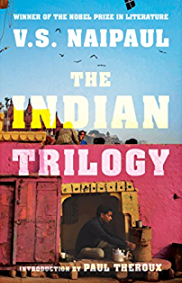V. S. Naipaul, An Area of Darkness (1964), India: A Wounded Civilization (1977), India: A Million Mutinies Now (1990)
I never liked V. S. Naipaul. I couldn’t get through A House for Mr. Biswas in college — so much whining! — and I found his essays in The New York Review of Books, which I read religiously in the nineties, to be tedious and cantankerous. So I was surprised to find that of all the travel accounts I have so far read of India, I like his the best.
Naipaul is, of course, a capable writer, a crafter of fine prose, and a skilled storyteller. What puts him above the other India writers, though, is the same cantankerousness that made him hard to take when reviewing other people’s work. More than anyone else, Naipaul owns up to the awfulness India brings out in him: the rages, the pettiness, the yelling at impassive bureaucrats, the scolding of poor hotel servants. He doesn’t hide it the way most of the other authors do, or downplay it, or try to excuse himself for it. He tells it in full, including the shame that comes afterward.
There are three books here. Naipaul is the grandchild of Indian brahmins who came to Trinidad as indentured servants. He is Indian and Hindu by heritage, but not by birth or nationality. An Area of Darkness is his account of his first foray into his ancestral homeland, and it is full of rich detail about the miseries and annoyances of Indian travel. India in 1964 was, of course, much more primitive than the India I encounter thirty-three years later, but it’s extraordinary how many of Naipaul’s experiences were similar to my own. Subsequent writers have called this book out for its obsession with shit — literal, actual shit — but Naipaul’s is on to something:
“It is possible, starting from that casual defecation in a veranda at an important assembly, to analyse the whole diseased society. Sanitation was linked to caste, caste to callousness, inefficiency and a hopelessly divided country, division to weakness, weakness to foreign rule. This is what Gandhi saw, and no one purely of India could have seen it.”
He isn’t just writing about shit to make fun of India or Indians, or to complain, but to recognize that the way sanitation is handled, or mishandled, says something important about the society as a whole. Again, there is a sort of bravery here in saying these things out loud, in pointing to the disgusting things and saying, without apology or excuse, that they are disgusting. Most other writers on India, especially foreign writers, feel a reflexive need to apologize for noticing, to explain away, to demonstrate their thoughtful respect for India and their understanding that its problems are not all of Indians’ own making. Naipaul alone is brave enough to show his loathing, both for what he sees and for himself for the ways he reacts.
In A Wounded Civilization, Naipaul attempts to reckon with the land that so overwhelmed him on his first visit. It’s the slightest of the three books, and it sticks in the memory less, but there’s a lot here, especially about Hinduism. And Naipaul begins to talk to Indians in a serious way, which gives depth to his writing.
That method becomes the main thrust in A Million Mutinies Now, which is probably the best of the three books, and certainly the most celebrated. By the late eighties, Naipaul is old enough to look beyond himself, and the entire book is essentially interviews with interesting Indians. There are gaps — Naipaul speaks to very few women, even in a chapter all about women’s magazines, and he mentions the poor, the backward castes, the harijans and adivasis, but rarely speaks to them either. He is a Western intellectual and also a brahmin, and he remains so throughout his travels.
He also falls into a trap that I notice is common to writers on India, which is considering Indian poverty somehow a moral burden when you are in India, but not when you’re elsewhere. I see this a lot, in Mark Tulley and Elizabeth Bumiller and others, and it’s a fallacy. Indian poverty is certainly much easier to ignore when one is in Manhattan than when one is in Calcutta, but there’s no particular reason why one should be more or less responsible for it based on where one happens to be, or on the accident of birth and citizenship. In terms of practicalities, it makes sense for people in Calcutta to focus more on Calcuttan problems and for New Yorkers to work on New York, but I find it disingenuous for a middle-class American to wonder how Indians can justify living a far more frugal middle-class life amidst such poverty. And this is particularly so for post-colonial nations like India, whose looted wealth makes our middle-class existences possible.
But that’s something of a side issue. Overall, A Million Mutinies Now is a fine book that, like the rest of the trilogy, takes unusual risks in the service of authorial honesty about his own flaws. Of the three, An Area of Darkness resonated most deeply with my own project, but anyone writing about India would be well served by these three powerful, honest, cantankerous books.

